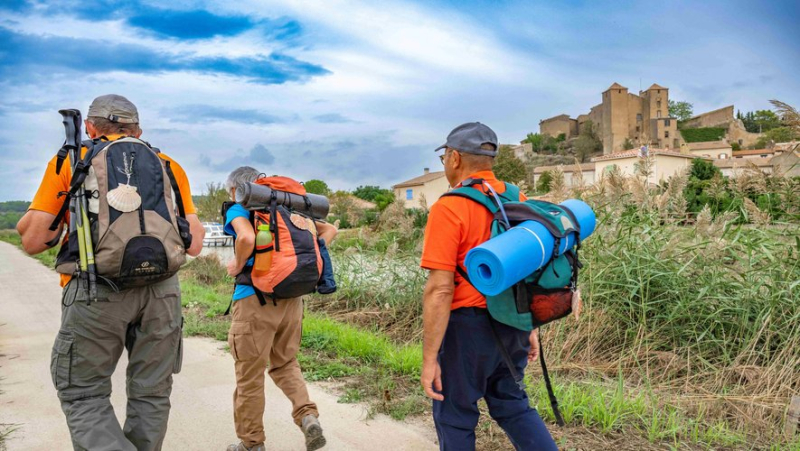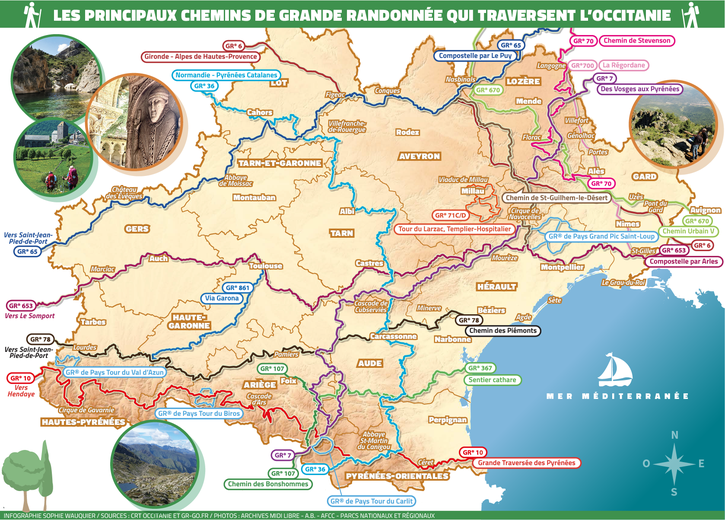FILE. Hiking in Occitania: “Some GRs are failing because of accommodation”

L'impact de la randonnée (ici à Argens-Minervois) est un levier économique. JJ DELBART/AFCC
This is the observation of the Gardois gîte owner and walker Michel Verdier, even if the GRs are natural boosts for the regional economy when the accommodation potential is there.
A whole local economy stays afloat thanks to the pilgrims, insists Laure Koupaliantz, the director of the French Agency for the Ways of Compostela. “With their inhabitants alone, many villages would not be able to keep a grocery store or an ATM.“
The flow of pilgrims contributes to this. Sometimes, the passage turns into a move: "Post-covid, we saw people who had made the journey and who came to settle down to live there."
Auvillar, near Moissac, in Tarn-et-Garonne, has created pilgrim accommodation via the intercommunality. In Aude, in Rieux-Minervois, a Pilgrims' House should open by the end of the year.

The Stevenson trail, for its part, is a victim of its own success, with an explosion in attendance but a stability in accommodation beds. “If some people want to retrain by opening a gîte in the Cévennes, now is the time, there is room“, encourages Joyce Lévéjac, project manager of the association Sur le chemin de Robert-Louis Stevenson.
The economic impact has been estimated at 10 million euros per year, multiplying the daily expenses of each hiker by the number of participants. “In 2016, the amount was estimated at 3.5 million euros“, specifies Joyce Sévéjac. That is three times less. The association, very active, also multiplies the activities and events, factors of social and cultural connection.
While some trails work very well, such as the Stevenson, Compostelle or Saint-Guilhem, others have not yet found their audience. “We then enter into vicious circles, there are few hikers because there is little accommodation and little accommodation because few hikers“, underlines Christophe Billard, elected member of the regional committee of the French Hiking Federation.
This is the case, he notes, in the Haut Languedoc. Rental companies then favor weekly reservations rather than overnight stays. It is the tourist reception as a whole that is lacking from time to time: “People no longer want to invest in this type of structure”, assures the Gardois gîte owner Michel Verdier. “In Saint-Jean-du-Gard, a restaurant has been for sale for ten years.”
Some paths don't take off
"Some paths are falling apart because of the accommodation", he confirms. "For the Régordane, from Vézénobres, there are practically no more lodgings to reach Avignon. It's prohibitive." The Saint-Guilhem trail works “because it has a network of accommodations“, he insists, noting that “the Urban V trail has great potential but is not taking off.” “For Compostela, the Arles trail is much less frequented than the Puy trail”, adds Christophe Billard.
Climate change is also another pitfall, concerning the impact of hiking on biodiversity and the problem of water resources. The Aire de Côte gîte on the Aigoual massif, at the intersection of the GR 6 and GR 7, was unable to open this year due to lack of water.
I subscribe to read the rest




